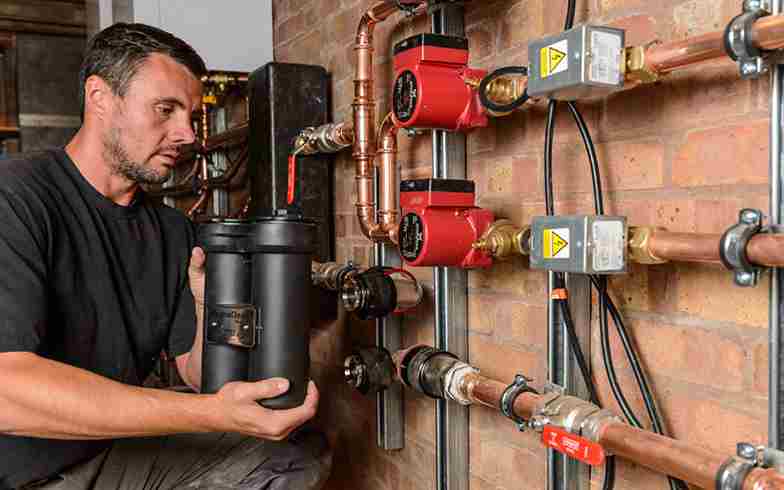What is Power Flushing heating system?
In central heating, Power flushing is the process by which dirt, sludge, debris, limescale and other problematic mineral deposits present in your heating system can get thoroughly removed from it. That way, you can expect your boiler to work at its best efficiency, thereby preventing blockages, corrosion, and eventually future breakdowns.
As water is used in boilers for transmitting heat, it flows via the pipes to different coils such as the radiators. But this water also carries with it some unwanted minerals. And when these impurities get deposited on the different internal parts of the boiler and start hampering the normal functioning of the system, power flushing is the best option suggested.
How does a Powerflushing heating system work?
To get your heating system power flushed, the gas engineers use a powerful pump that they connect to the heating system. Once they are both connected, a chemical mixture is made to pass through the pump with high pressure to the heating system. This mixture then cleans the sludge and rust present in the system to a great extent. After this, water is passed through the system instead of that chemical mixture with good force, and thereby your heating system gets thoroughly cleaned.
When to go for Power Flush
Mostly, a power flush is not right for new boilers, as we don’t expect heavy sludge formation in these boilers. But that might not be the case if your boiler is quite old. However, there are certain signs, you can get from your boiler, which can indicate that you need a power flush. Do check if you can find
- Cold Spots on your Radiators, mostly at the bottom
- Unclean Water Coming out of the Radiators.
- Pipes turn hot, while radiators are cold.
- Noise coming out of boilers or/and radiators
- Radiators take a long time to heat
- Boilers turning off and getting restarted by itself
- Pump not working
- Leakages, anywhere in the pipes, boilers, and radiators.
- So if you are noticing any one or two of these symptoms, that will indicate sludge formation in your system, Powerflushing can get your heating system clean and effectively operating.
Though for a newly installed boiler, it’s a waste of money., power flushing can be a wiser decision to get your old heating system power flushed before you are installing a new boiler. That will help your new boiler not get affected by the dirt, present in the system.
How often do you need power flushing?
Generally, if boiler servicing is recommended to be done annually, its power flushing should be done every 5-6 years. However, it should better be judged by a gas engineer, as to when or whether your heating system will go for power flushing.
Time is taken for a Power Flush – Depending on how big or small your heating system is, and also the amount of sludge the system has got, the power flushing heating system can take from a few hours to even one or two days.
Benefits of Power Flush Heating System
Anyways, for deep, intense cleaning, power flushing your heating system is important, mostly if you are in a hard water area. A few of its benefits have been discussed below are:
- Increased Boiler Efficiency
- Lesser Chance of Boiler Breakdowns
- Reduced Energy and Repair Bills
- Increased Boiler Reliability
- Longer Boiler Lifespan
- Better Quality heating and hot water supply
- Other Precautionary Measures for a Clean Heating System
- Though power flushing can get your heating system clean and effective, there are other precautionary measures, that can prevent such mineral deposit formation in the system and thereby increase your boiler longevity.
Magnetic Filter: The magnetic material present in a magnetic filer can attract the mineral particles present in the water and thereby helps in removing them. The magnetic filter thus helps in maintaining clean water free from any sludge and limescale.
Inhibitor: An inhibitor is a chemical liquid, that’s mainly used in central heating to prevent corrosion. Mostly, the gas engineers apply this liquid to the heating system at the end of the power flush process to stop any further sludge formation. However, adding this inhibitor to your heating system at an interval of 1 year will ensure that your system can get better protection from rust, sludge, and limescale.
Is power flushing always the best option? – Old boilers are the ones that mainly require power flushing as they are used more and have more mineral deposits. But at times, power flushing does not turn out to be the right option for your boiler even if it is old, mostly if it is more than 15 years old. Rather gas engineers may suggest you opt for a boiler replacement if the system is too corroded and damaged. Maybe it’s the sludge formation, which is the reason behind such corrosion. But if the part of the system is worn out, power flushing will just do its job in getting it cleaned, but will not fix it. As our gas engineers in F.A.S Plumbing & Heating Ltd. are all fully certified and experienced, they will properly inspect your heating system before starting the job. If needed, we will discuss with you the best alternatives, that would be more beneficial for you in the long run.
How Power Flush is Different from Chemical Flush?
There are instances where we find just one or two radiators, not performing right. If that’s because of the dirt and debris in them, you can get those radiators chemically flushed. In this process, any kind of localized sludge formation in the heating system can be cleaned without the help of any pump, as used in power flush.
However, if you want an intensive cleaning of the entire heating system which is too dirty, a chemical flush will not serve the purpose. A power flush will be an effective option then.




